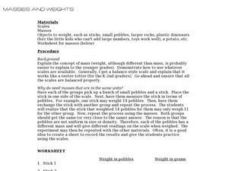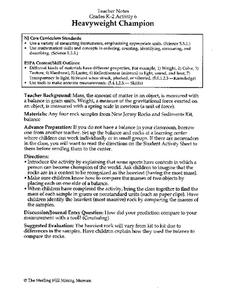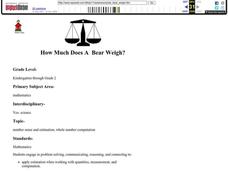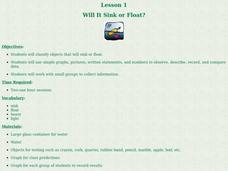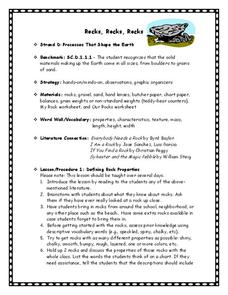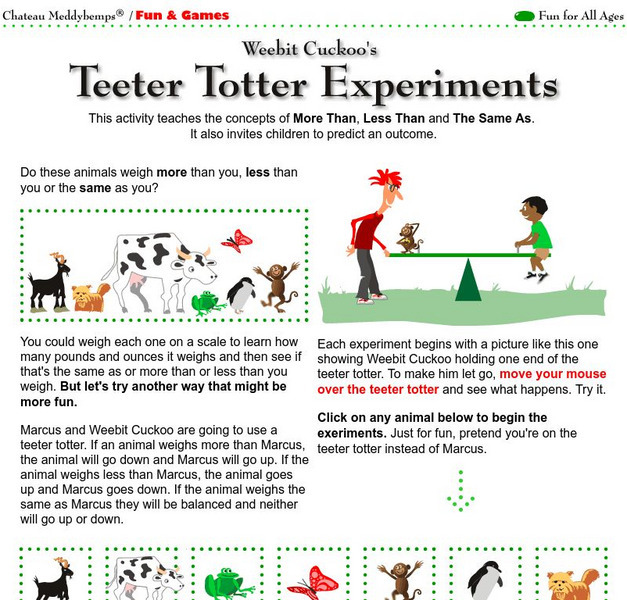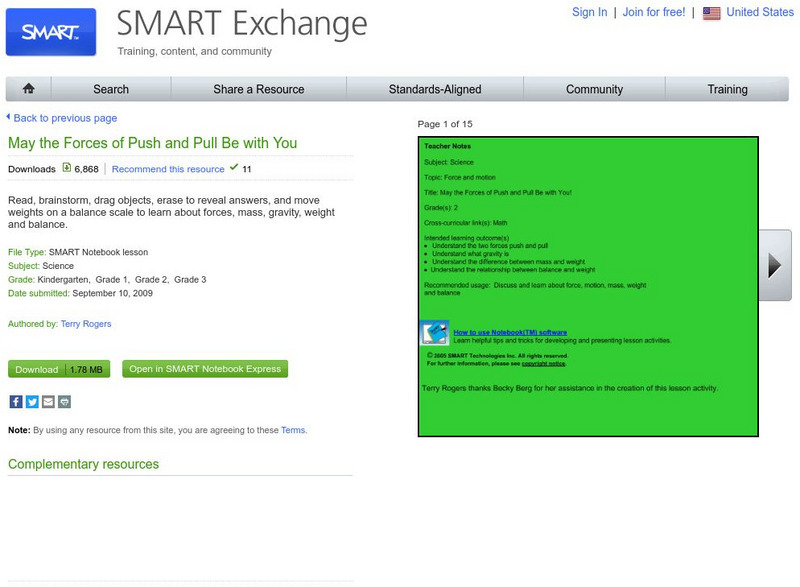Curated OER
Masses and Weights
Students explore the concept of weight and mass and the importance of units. Using a balance, they determine the weight of various objects in the unit of "pebbles" and in grams.
Curated OER
Heavyweight Champion
Students identify what mass is and how to measure an object with a balance in gram units. Students identify weight and how to measure with a spring scale in units of force. Students compare the masses of two objects by placing each on...
Curated OER
Making It Balance
Students listen to story, "The 100-Pound Problem," compare their weight with character in story, and weigh different classroom items using nonstandard units and standard units. They experiment with different items that can make scale...
Curated OER
How Much Does a Bear Weigh?
Students estimate how many children in their class it would take to equal the mass of one adult bear. They then weigh and record their measurement on a chart to check their estimate.
Curated OER
Air Is there
Students experiment to observe air and its mass. In this air lesson, students use the scientific method to complete experiments that demonstrate the properties of air. Students view a video as follow-up.
Curated OER
Will It Sink or Float?
Students perform experiments to see if items will sink or float. In this sink or float lesson, students work in groups to make predictions, and record the results. After the experiments are complete students make a book of the results.
Curated OER
Rules of Force and Motion
Students view a video and complete experiments with force and motion. In this force and motion instructional activity, students examine small pieces and how they affect the motion of a toy car. Students also experiment with...
Curated OER
Rocks, Rocks, Rocks
Young scholars are introduced to how the different types of rocks formed. As a class, they are read a book about rocks and create a list of what they already know about them. Using examples of rocks they find around the school, they...
Curated OER
Physics Post-Lab
Students explore physics. In this science lesson, students discuss physics in their everyday lives. Students complete a physics worksheet.
Science4Fun
Science4 Fun: Mass and Weight
What is mass? What is weight? Illustrated discussion of mass and weight including how they are measured.
Science4Fun
Science4 Fun: Gravity
Peruse this resource to learn about gravity, its importance, the Universal Law of Gravitation, the difference between mass and weight, and more fun facts.
ClassFlow
Class Flow: Introduction to Matter
[Free Registration/Login Required] This flipchart is a basic introduction to the properties of matter, mass, and weight. It discusses the physical properties of objects.
Chateau Meddybemps
Chateau Meddybemps: Teeter Totter Experiments
Practice comparing mass by trying the Teeter Totter Experiment. Watch the teeter totter move up and down as you compare Marcus to each animal.
SMART Technologies
Smart: May the Forces of Push and Pull Be With You!
Read, brainstorm, drag objects, erase to reveal answers, and move weights on a balance scale to learn about forces, mass, gravity, weight, and balance in this activity created by SMART.
PBS
Pbs Teachers: Submarine Race Experiment
Balance the force of gravity with the force of the expanding gasses created by mixing baking soda and vinegar. Create a soda bottle submarine that sinks to the bottom of the bathtub and then rises back to the surface.
PBS
Pbs Teachers: Boats Afloat Experiment
Estimate how many pennies a flatboat made of aluminum foil will hold, then test your hypothesis.
Other popular searches
- Weight and Mass
- Weight vs Mass
- Measuring Mass and Weight
- Balanced Forces Mass Weight
- Mass and Weight Kindergarten
- Science Mass and Weight
- Math Mass and Weight
- Weight and Mass Measurement
- Weight Mass
- Mass and Weight Calculations
- Mass and Weight Activities
- Math, Mass and Weight
